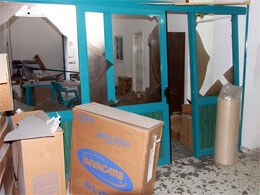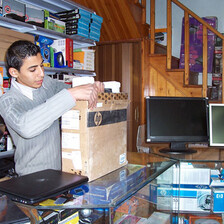The Electronic Intifada 28 February 2008

Photo showing damage to warehouse where PMRS kept equipment for handicapped people, which was damaged in the air strike. (Palestinian Medical Relief Society)
The Israeli military said the air strike targeted a Hamas headquarters in the western part of the Gaza Strip.
In Israel a 47-year-old man was killed in the late afternoon by Palestinian rockets fired by Hamas. In total over 70 rockets were fired in the afternoon and evening.
The latest escalation in violence, which residents say is the most serious in recent weeks, began in the early morning of 27 February when Israeli air strikes killed six Palestinian militants, Gaza sources said. By afternoon, the rockets, seen as a retaliatory move by Hamas, rained down in southern Israel, mostly on Sderot but also on Ashkelon, a city north of Gaza.
One rocket fell within the grounds of the local hospital there, the Israeli military said, noting that the wounded from Sderot were being evacuated to the facility.
According to medical officials and human rights groups in Gaza, by the morning of 28 February, at least 16 people, mostly militants had been killed in the Gaza Strip in several air strikes.
Damage to PMRS equipment
PMRS, a non-governmental organization (NGO), is a large association which provides health services, including emergency ambulatory care, to Palestinians in the West Bank and the Gaza Strip.
Iyad Yaghi, a senior official at the NGO, said the building was the group’s main administrative center in the Gaza Strip, and it also housed their central pharmacy and a warehouse of equipment for handicapped people.
“We had a lot of equipment damaged, including wheelchairs, crutches and walkers,” he told IRIN.
Most seriously, a mobile clinic unit, which had laboratory tools as well as an ultrasound machine, was completely destroyed in the attack, he said. Also, a generator was damaged, possibly beyond repair. The rolling power outages in Gaza make generators an essential piece of equipment, particularly for medical centers.
The Israeli restrictions on imports had Adbel Hadi Abu Khussa, the director of the PMRS in Gaza, very concerned.
“I don’t know what we will do, we can’t import. We can’t get cement or spare parts to repair the damage … Even drugs we don’t always receive,” he said, noting that the offices were running by and large without paper as they were unable to import new supplies.
This item comes to you via IRIN, a UN humanitarian news and information service, but may not necessarily reflect the views of the United Nations or its agencies. All IRIN material may be reposted or reprinted free-of-charge; refer to the copyright page for conditions of use. IRIN is a project of the UN Office for the Coordination of Humanitarian Affairs.
Related Links


